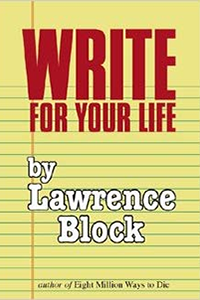 I’ve been working my way through Lawrence Block’s book Write for Your Life, doing the assignments contained therein.
I’ve been working my way through Lawrence Block’s book Write for Your Life, doing the assignments contained therein.
Why?
Well, first of all, Block has written over 100 novels and over 100 short stories. His career started in the 1950s, and he was named a Grand Master by the Mystery Writers of America in 1994. His accomplishments in the writing life command my admiration and respect. He’s someone I’m honored to learn from.
Secondly, I’ve read each of the four writer’s guides penned by Block, and I like the man’s approach to living as it comes through in his writerly advice. He’s down-to-earth, he’s real, and he has a lot of insight into being human.
And, thirdly, when I first read Write for Your Life (without doing the assignments), there was one passage which really caught my attention and made me vow to return, pen in hand and paper before me. The gist of it:
Do the writers who work the hardest achieve greater success? Not from what Block has observed. A certain threshold of work is necessary, but beyond that he has not seen correlation between effort expended and success achieved.
The biggest factors in success are the beliefs you hold about yourself, your writing, and the world. What you think is what you get. “As a man thinketh in his heart, so is he.”
Therefore, you must learn what beliefs hold you back and confront them, so as to change them.
I am very interested in removing any internal blocks that stand in the way of my success.
Most of the assignments detailed in Write for Your Life are too personal to share in a blog. But the chapter titled “Your Most Unforgettable Characters” includes two assignments that are not personal at all. In fact, they are rather fun, so I thought I’d share the first of them right here and right now.
These were Block’s instructions:
• Seek out a public space.
• Take note of a stranger there, someone of whom you know nothing beyond what you can observe.
• Spend some time unobtrusively observing that person. How do they move, how do they talk, what do they wear? Don’t take notes; just get a good sense of them.
• Then go home, thinking about the stranger as you go. How might they react to events? What might they feel? Think?
ª Once home, get out pen and paper, give the person a name, and make a list of the person’s characteristics. Some items will be things you observed, some inventions, some a mix.
Since it was 9 pm as I was reading these instructions, and as I was already in my pajamas, I decided to make an adjustment to the assignment. I neither wanted to get dressed again and go out somewhere nor to wait until the morrow to do so.
Instead, I meditated upon my memory of a photograph I clipped from a magazine 30 years ago (now lost), because I found the image so arresting that I imagined myself (even then) writing a story about the woman depicted.
Rather than describing the photograph for you, I’m going to transcribe what I wrote for the assignment.
Note: My adaptation is an excellent option as we all shelter in place during COVID-19. You wouldn’t want to be hanging out in a crowd right now!
She has copper-red hair, long and very straight. She wears it in a horse-tail at the crown of her head. Her skin is very pale, but it neither burns nor tans, no matter how much sun she gets.
She wears tangerine-colored harem pants and sandals with many straps, like the footgear of the ancient Roman soldiers.
She wears a peach-colored vest secured in front by chains of gold. The vest is short, so her midriff is exposed, just a few inches. The front edges of the vest do not quite meet, so her cleavage is visible, also her navel.
She lives in a salt desert in a residence built of salt bricks.
Her people “mine” the salt and sell it afar via caravan.
They possess something called “salt magic” which involves colored salts and can be used to repair both inert things and living beings.
Zelle holds a position of authority, but not the ultimate authority. I think she is the assistant to one of the crone mages.
She feels a sense of personal power when she argues with people or causes them to feel annoyance.
Her magical abilities were discovered when she was 5 years old, and she was taken away from her family to learn control of her gift in the palace from which the crone queen rules. Zelle felt very small, lonely, vulnerable, and lost at first.
She proved very talented, so she leaned into her magic as a way to feel secure.
She didn’t boast to her peers, because she somehow felt it would be undignified. Instead she learned to find small and unobtrusive ways to cause trouble for her cohorts, which made her feel strong.
She never helped her classmates, because being better at classwork made her feel good. But not boasting meant they did not realize just how good she was and thus did not marshall their resources to catch up. She studied all the time, except when she worked to create subtle pain and annoyance for others. Her teachers did recognize her excellence.
What does Zelle want?
I think she wants exactly what she has: enough authority, but less visibility. Ah! But she is beginning to feel affection for the crone mage she serves. She is unhappy about this, because she feels more comfortable with aggression and hostility.
There could be a story here.
What if a caravan of foreigners entered the salt lands instead of waiting on the caravans the salt landers send out?
The salt landers hate this invasion, Zelle included. But the assistant to the caravan master attracts her. And he seems more conscious of her than he should be.
 But what if there is another element to events than this? There is water en route. Not overland, but as a storm approaching. The salt landers can see clouds building and building. When the deluge arrives, the flood will inundate the salt plan and dissolve the salt.
But what if there is another element to events than this? There is water en route. Not overland, but as a storm approaching. The salt landers can see clouds building and building. When the deluge arrives, the flood will inundate the salt plan and dissolve the salt.
How do the salt landers manage in their salt desert? They use their magic to make glass utensils, pipes, basins, and even furniture.
Why is someone aiming a rainstorm at them?
Block speaks of this exercise not as the route by which to create characters in one’s stories, but as a way to gain access to areas of one’s own personality that might otherwise remain buried.
The next exercise in the chapter builds on this one. I’ll tell you about it next week! 😀
Lawrence Block and Unforgettable Characters—Take 2

